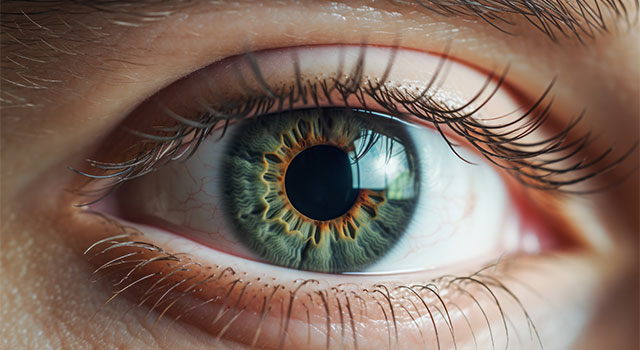
The cornea is the transparent, dome-shaped surface at the front of the eye. It acts as a window, focusing light as it enters the eye and directing it toward the retina, where the image is processed. Because of its role in focusing, a healthy cornea is essential for clear vision. Damage, irregularity, or disease in the cornea can disrupt this process, leading to blurred vision, pain, or even permanent damage if left untreated.
Below, our Philadelphia eye care team at Fox Chase Family Eye Care discusses some common corneal conditions and how we can help.
Common Corneal Conditions
Keratoconus
Keratoconus is a progressive condition where the cornea thins and bulges into a cone-like shape. This irregular curvature prevents the cornea from properly focusing light, causing distorted vision, glare, and increased sensitivity to light. It often starts in adolescence or early adulthood and can worsen over time.
Corneal Ulcers
Corneal ulcers are open sores that develop on the corneal surface, often caused by infections, injuries, or improper contact lens use. Symptoms include redness, pain, blurred vision, and sensitivity to light. Prompt treatment with antibiotics or antifungal medication is critical to prevent further complications.
Dry Eye Syndrome
Dry eye syndrome occurs when the eye doesn’t produce enough tears or the tears evaporate too quickly, leaving the cornea unprotected. Symptoms include irritation, burning, redness, and fluctuating vision. Left untreated, severe dry eye can lead to damage to the corneal surface.
Corneal Crosslinking: A Breakthrough Treatment
For patients with keratoconus, corneal crosslinking is a game-changing, minimally invasive procedure that helps stabilize the cornea and prevent further vision loss. During the treatment, vitamin B2 (riboflavin) drops are applied to the eye, followed by ultraviolet (UV) light exposure. This combination strengthens the collagen fibers in the cornea, halting its thinning and bulging.
While corneal crosslinking does not reverse keratoconus, it effectively stops progression and preserves existing vision. The procedure is safe, quick, and can make a significant difference in managing this condition when diagnosed early.
Specialty Contacts and Scleral Lenses Near You
For patients with keratoconus, corneal irregularities, or severe dry eye, specialty contact lenses, including scleral lenses, are an excellent solution to restore clear vision and comfort. Unlike traditional contact lenses, scleral lenses are larger and rest on the white part of the eye (the sclera) rather than the cornea.
How Scleral Lenses Work
Scleral lenses vault over the corneal surface, creating a tear-filled reservoir between the lens and the eye. This protects the cornea, provides constant hydration, and smooths out any irregularities to deliver sharp, clear vision.
Benefits of Scleral Lenses
- Comfort: Because the lens doesn’t sit directly on the cornea, it reduces irritation for patients with corneal damage or dryness.
- Improved Vision: Scleral lenses effectively address vision problems caused by keratoconus, scarring, or irregular corneal shapes.
- Hydration: The tear-filled space keeps the eye lubricated, making them ideal for severe dry eye syndrome.
With proper fitting by an experienced eye care professional, scleral lenses can transform your visual experience and improve quality of life.
Protect Your Vision with Expert Corneal Care
Corneal diseases can be challenging, but advanced treatments like corneal crosslinking and scleral lenses offer hope and relief. If you’re experiencing symptoms like blurry vision, irritation, or light sensitivity, don’t wait—early intervention can prevent further damage and preserve your vision.
Our team specializes in managing corneal conditions and providing customized treatment solutions to meet your unique needs. Contact us today to schedule an evaluation and take the first step toward clearer, healthier vision.
